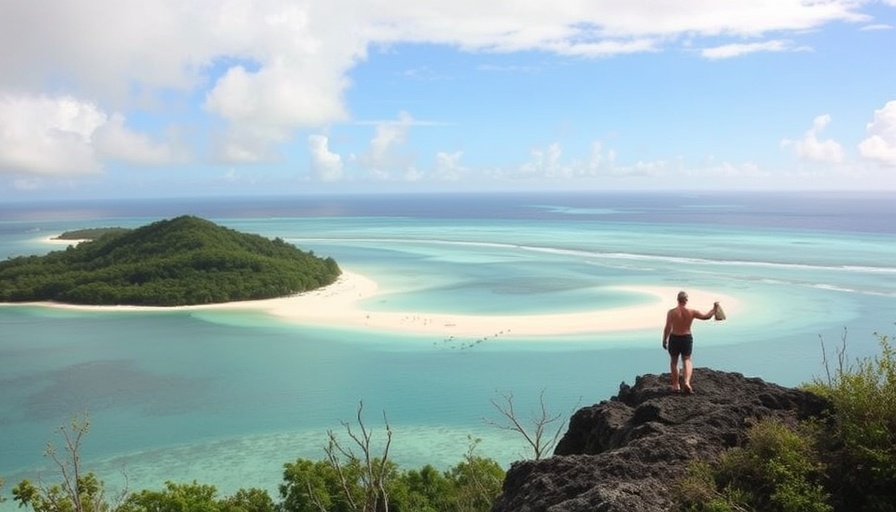
Climate Crisis Drives Tuvaluans to Seek New Horizons
Amid rising seas and deteriorating conditions, more than one-third of the population of Tuvalu—approximately 3,400 people—are actively applying for climate visas to relocate to Australia. This unprecedented move highlights the severe impacts of climate change on vulnerable island nations, particularly those like Tuvalu, whose very existence is threatened by rising sea levels and extreme weather events.
This Unique Climate Visa: A Lifeline for Tuvaluans
Australia has initiated a world-first climate visa program that will allow 280 Tuvaluans per year to gain permanent residency, opening avenues for education, work, and a semblance of stability as their homeland becomes increasingly uninhabitable. Given Tuvalu's lowest elevation of just 6 feet 7 inches, the stakes are high, and the urgency is palpable with forecasts indicating that areas such as Funafuti could be underwater during high tide as early as 2050.
Understanding Tuvalu's Cultural Connection to Land
For the residents of Tuvalu, the bond with their homeland goes beyond mere geography. Their culture is intricately tied to the land; for Tuvaluans, home represents their identity, heritage, and community. As Kamal Amakrane of the Global Center for Climate Mobility notes, leaving the islands is a last resort for many, but climate change is forcing this painful decision.
Community Response and Personal Stories
The emotional toll of potential displacement is profound. As more Tuvaluans enter the lottery for climate visas, the stories of families hoping for a new start in Australia resonate deeply at a local level. This collective shift is marked by mixed emotions: hope amidst uncertainty, as families dream of stability in a foreign land while mourning the loss of their ancestral homes.
Alternatives and Challenges: The Reality of Relocation
While the climate visa provides a path forward, it also raises critical questions regarding the future of Tuvalu. Some experts warn that this exodus may lead to labor shortages on the islands, further complicating the nation’s fragile economy. John Connell, a geographer at the University of Sydney, shares concerns about small states like Tuvalu being unable to sustain their workforce if migration becomes widespread.
A Global Perspective on Climate Migration
This situation isn't unique to Tuvalu; we are witnessing a growing trend of climate-induced migration across the globe. Small island developing states such as Kiribati and the Maldives are likewise grappling with existential threats from rising seas. As climate change elevates the scale of displacement, it challenges international policies and humanitarian frameworks to adapt and support those forced to migrate.
The Path Ahead: Australia’s Role and Responsibility
Australia's climate visa program signals recognition of the plight of Tuvaluans, but it also imposes certain obligations. Under the Falepili Union agreement, Tuvalu must seek Australian approval before establishing security relationships with other nations, showcasing the geopolitical dimensions of climate migration. This illustrates how climate action is intrinsically linked to broader geopolitical considerations, making it a contentious topic in international relations.
Actionable Steps Toward Climate Responsibility
This pivotal moment emphasizes the necessity for communities globally to advocate for climate-conscious policies that support vulnerable nations. For residents of San Diego, this could mean pressing local governments for sustainability initiatives, reducing their carbon footprint, or supporting organizations working on behalf of those displaced by climate change. With two coastal cities experiencing similar threats, the ripple effects of Tuvalu's situation can guide proactive measures and enrich discussions on how to build resilient coastal communities.
Reflecting on Our Future
The plight of Tuvalu serves as a stark reminder that climate change impacts everyone, regardless of geographical borders. As more individuals, cities, and nations acknowledge this reality, a global movement toward sustainability and support for climate refugees is needed. Engaging in dialogues, exploring local solutions, and enhancing awareness will be essential as we navigate this new climate reality together.
As residents of San Diego, let us reflect on our coastal community's vulnerabilities and consider how we can act now to create a more resilient future, ensuring that stories like those of the Tuvaluans are met with empathy and actionable support.
 Add Row
Add Row  Add
Add 




Write A Comment